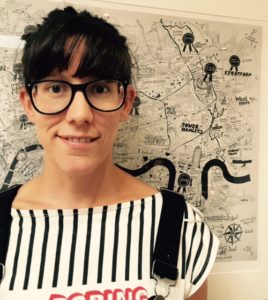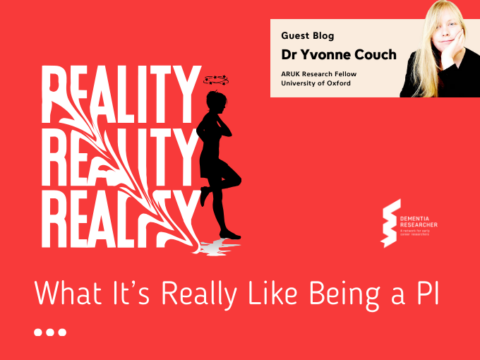As a recent PhD graduate, I have now moved on to supervising others. It sounds rather sudden, and it really wasn’t. Throughout my PhD I have been able to supervise MSc project students, initially with support from my supervisor and then gradually moving to supervising with other peers and colleagues. These MSc students have been completing a piece of work, often one that forms a part of the larger part of my work, or a discreet project unto itself. Completing these research projects is a key component of the MSc degree qualifications, enabling them to develop some applied research skills. Yet, they are also important and valued members of the research project team.
During my PhD I took four MSc Speech and Language Therapy students every year. They were able to complete some component of the blinded work that my research study involved. For example, during my intervention trial the participants were assessed at the end of the study, after a period of treatment / no treatment depending on the group they had been randomised to, by someone who needed to be blinded to the randomisation to reduce bias. I also collected video recordings of local speech and language therapists delivering the intervention I had developed, during the fidelity evaluation the transcription and coding needed to be done by someone unbiased. Finally, I also collated video recordings of the participants in conversations, these also needed to be transcribed and coded by researchers, blinded to the randomisation and diagnosis of the participants. The MSc students were therefore vital to this process.

Think complex and speak simple.
More recently we ran some focus groups with people with progressive aphasia and their families. We wanted to know a bit more about their opinions around speech and language therapy treatments. Had we asked a speech and language therapist to run these, the participants may have felt more obliged to comment on the benefits of the discipline. The student who ran the groups was completing an MSc in a completely different subject, though still dementia focused. This meant she was able to facilitate the meeting and provide a forum where people were better able to be open about the opinions in the discussion.
Each of these students has used the data (all or parts of it) they collected to write up a different project, with a somewhat different research question and analysis. Supporting students to develop their writing skills has also helped me develop my supervision skills. I am particularly mindful that I have found writing difficult at times (I think we all have!), and I have realised that giving feedback to others on their writing needs careful thought. I have found myself admiring the way others write about the work we are doing together. I have also found myself realising how much I have learnt and developed my own writing when I pick up grammatical or tense errors that I myself am prone to.
I have just recently done some training in supervision, as I embark on the next stage of my ECR pathway and am hoping to supervise PhD students in the near future. The training focused on all the usual things, drawing my attention to the relevant policy and procedures, ethics and regulations etc. The training also focused on supervision approaches, whether I preference taking a more nurturing approach to encouraging people to develop, or whether I like to provoke discussion, debate and critical thinking by challenging the person, or whether I like to work collaboratively in a team type model. I feel that I am currently at an advantage having just completed my PhD. I find myself constantly thinking about how I felt, about what I did and I didn’t find useful. I also feel rather lucky that as an ECR I continue to be able to learn about how it is to be supervised and how it is to be supervisee. I must admit, I also realise there are so many clinical skills that I can bring to this. In supervising clinical students, in delivering therapy to clients and their families and working as part of an multidisciplinary team I have realised I have developed skills that are transferable to supervising students.
Despite my positive experiences, I have realised that many people can be slightly reticent or worried about supervising students.
The following are my top nine (not 10) reasons for supervising students as an ECR:
 Providing opportunities to do dementia research can encourage students to consider a career path in dementia research. Dementia research is often considered ‘less sexy’ compared to other areas. I tend to find that when working together, students become as excited about the work as I am.
Providing opportunities to do dementia research can encourage students to consider a career path in dementia research. Dementia research is often considered ‘less sexy’ compared to other areas. I tend to find that when working together, students become as excited about the work as I am.
 Having enthused a student to work in dementia, they are more likely to come back to you in the future, for supervision or collaboration or mentorship. Building ongoing relationships with your students can be extremely productive.
Having enthused a student to work in dementia, they are more likely to come back to you in the future, for supervision or collaboration or mentorship. Building ongoing relationships with your students can be extremely productive.
 Students can enhance your work by providing a willing workforce, and improve the rigour of the project you are working on by providing that blinded / less biased researcher. As an ECR we can often rely on the kindness of our peers and colleagues when we need this kind of help. Students, however, often have more time and flexibility to assist in this role. Of course, long term we will all ideally be able to employ our own RAs or post-docs.
Students can enhance your work by providing a willing workforce, and improve the rigour of the project you are working on by providing that blinded / less biased researcher. As an ECR we can often rely on the kindness of our peers and colleagues when we need this kind of help. Students, however, often have more time and flexibility to assist in this role. Of course, long term we will all ideally be able to employ our own RAs or post-docs.
 While we wait for those big grants, that will allow us to employ those people, or host a PhD studentship, the student projects can enable us to develop these skills. In completing my application to become a PhD supervisor recently, I was able to demonstrate how I have been developing this skill by listing the MSc student projects I have supervised.
While we wait for those big grants, that will allow us to employ those people, or host a PhD studentship, the student projects can enable us to develop these skills. In completing my application to become a PhD supervisor recently, I was able to demonstrate how I have been developing this skill by listing the MSc student projects I have supervised.
 Students are so knowledgeable that I often learn from them. They might find a really useful paper I hadn’t located. They often see the data from a different angle or perspective. This might mean they produce graphs or tables in a format I hadn’t previously considered, but they also stimulate discussion and debate.
Students are so knowledgeable that I often learn from them. They might find a really useful paper I hadn’t located. They often see the data from a different angle or perspective. This might mean they produce graphs or tables in a format I hadn’t previously considered, but they also stimulate discussion and debate.
 Writing has been something I have fallen in and out of love with. Generally, I love it. When I read student projects, I find myself learning more about writing. They say the more you read you better you write. And I certainly notice that the more I read and assist and comment on student’s writing the more I am able to apply this to my own writing too.
Writing has been something I have fallen in and out of love with. Generally, I love it. When I read student projects, I find myself learning more about writing. They say the more you read you better you write. And I certainly notice that the more I read and assist and comment on student’s writing the more I am able to apply this to my own writing too.
 Students come from a broad range of backgrounds, and often from overseas. I have had students who have shared their experiences with colleagues and peers at home, thus disseminating the work internationally in a way I couldn’t have anticipated.
Students come from a broad range of backgrounds, and often from overseas. I have had students who have shared their experiences with colleagues and peers at home, thus disseminating the work internationally in a way I couldn’t have anticipated.
 People with dementia and their families find students stimulating. They find speaking with students is exciting and they like to contribute to their development. Student supervision is not just two way- it can be great for people with dementia too.
People with dementia and their families find students stimulating. They find speaking with students is exciting and they like to contribute to their development. Student supervision is not just two way- it can be great for people with dementia too.
 Supervising students is fun.
Supervising students is fun.
Author
Dr Anna Volkmer is a Speech and Language Therapist and researcher in Language and Cognition, Department of Psychology and Language Sciences, University College London. Anna is researching Speech and language therapy interventions in language led dementia and was once voted scariest speech and language therapist (even her children agree).

 Print This Post
Print This Post




